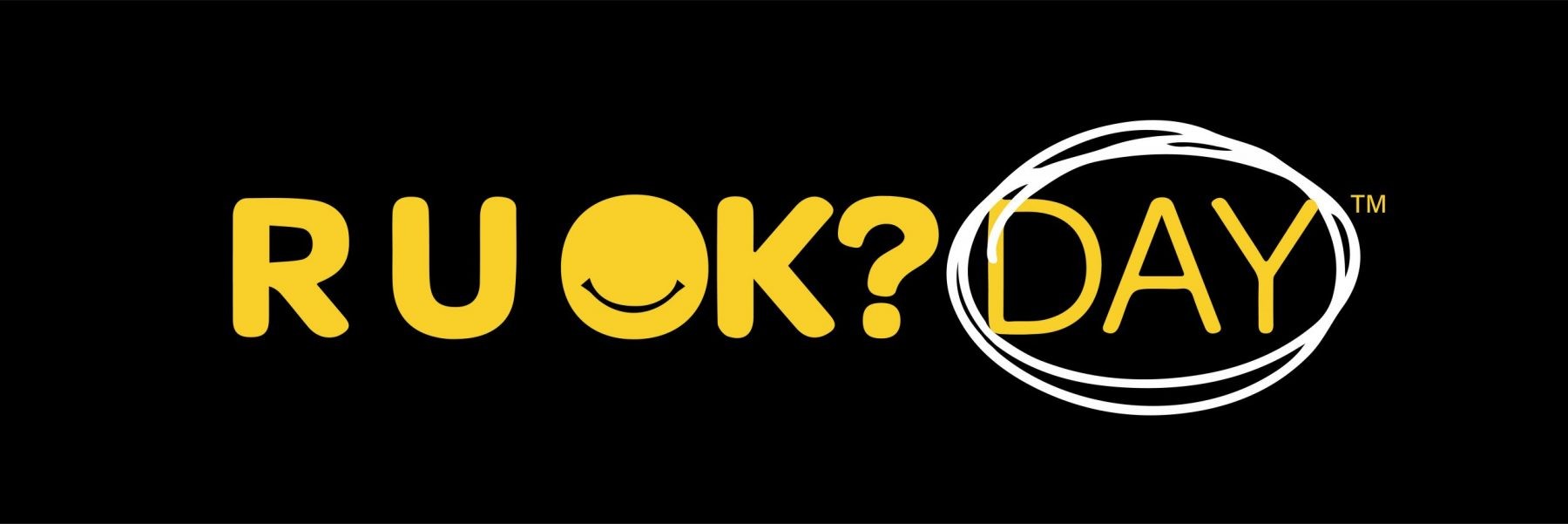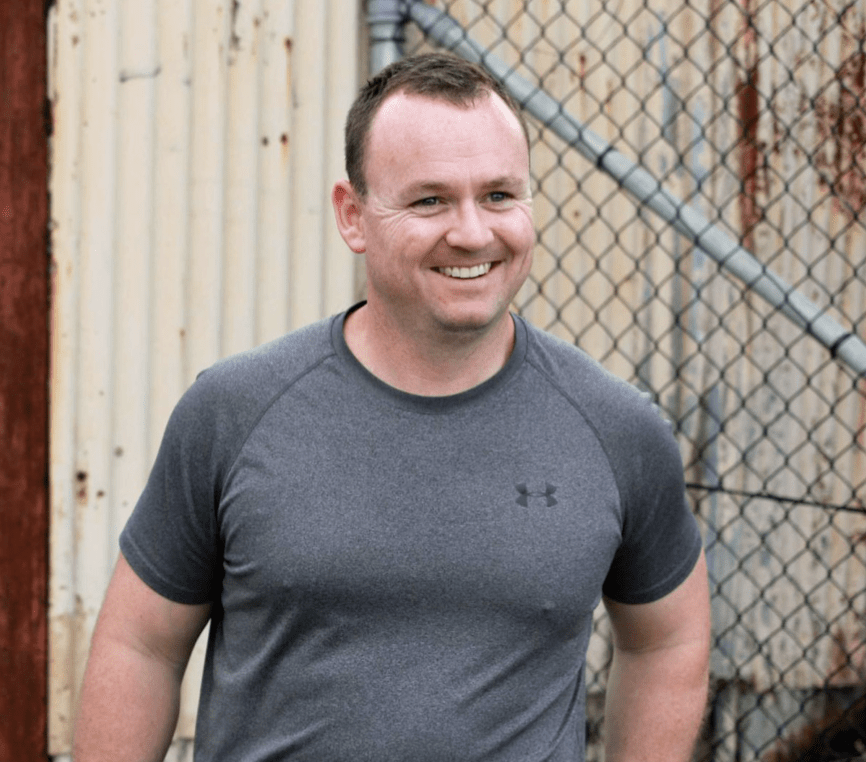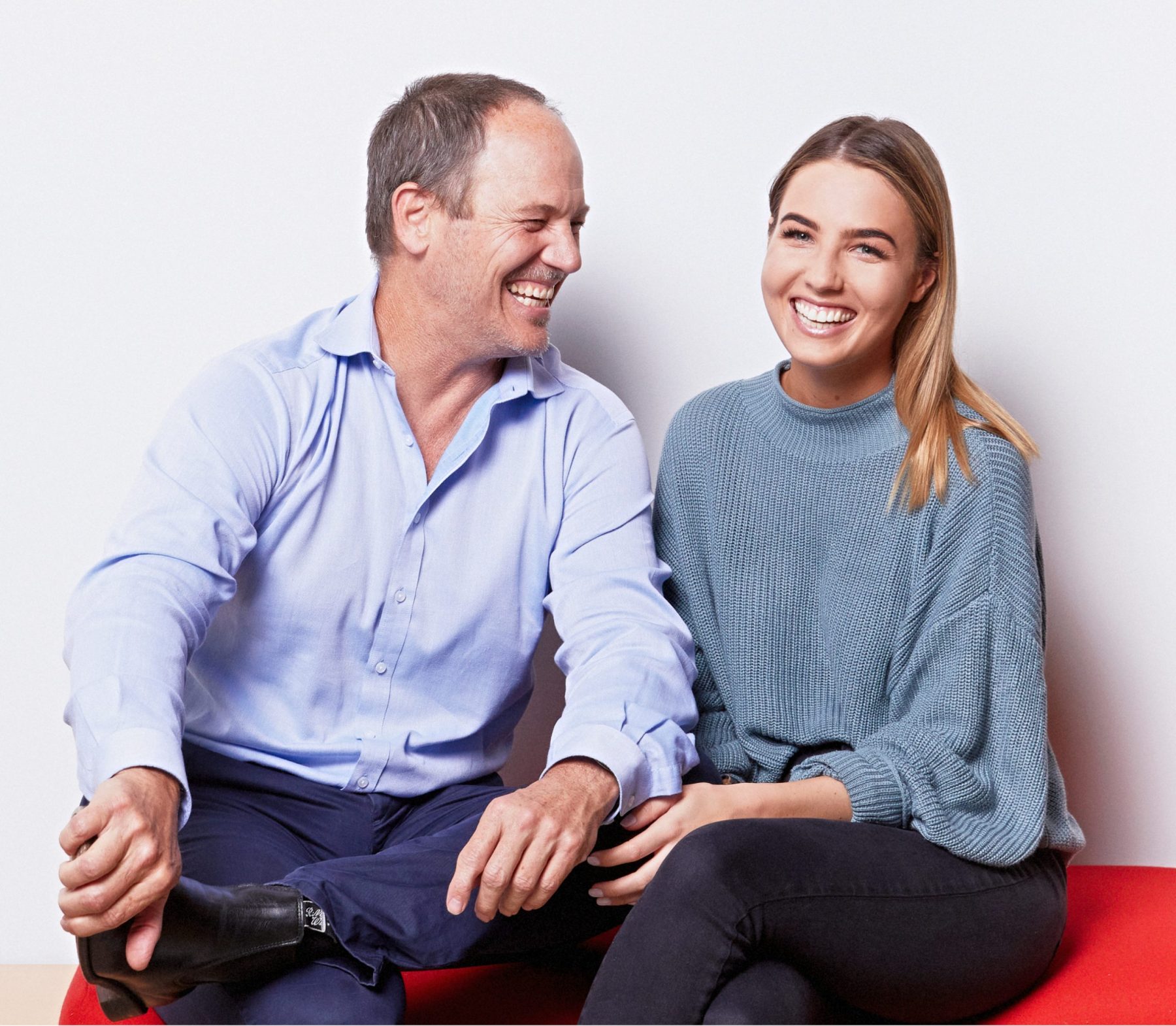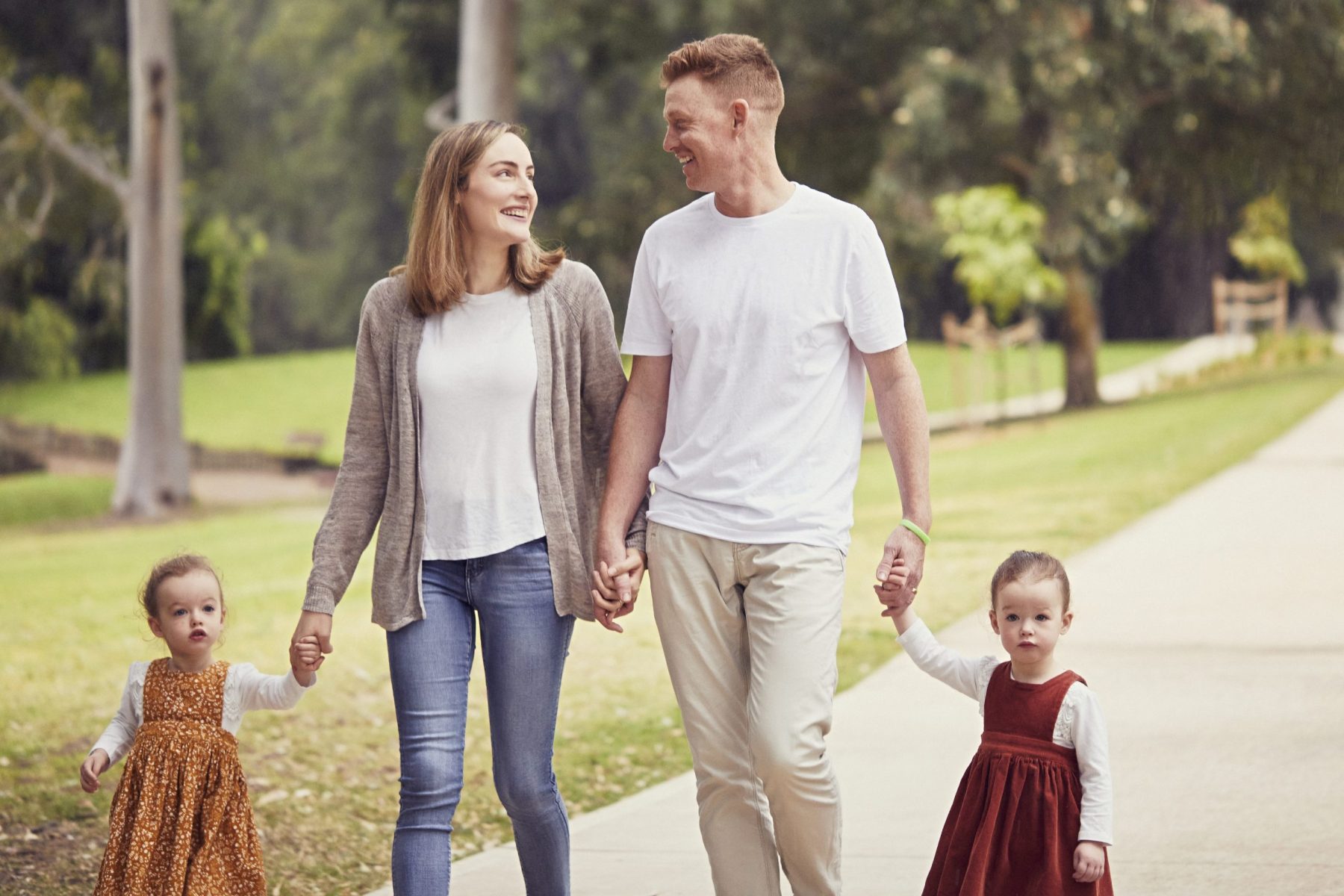

Every year, one in five Australians experience mental illness^. Every day, eight people die by suicide – the leading cause of death for Australians aged 15 – 44*. We’re living in the grip of a mental health crisis – and yet the stigma remains.
At FDC, we’re passionate about supporting mental health, and promoting the message that it’s ok to not be ok. Below, three people connected to the FDC family share their stories of mental adversity, proving that even in darkness, it’s possible to find the light.
It takes strength to be vulnerable, and having someone to talk to can be the difference between succumbing and surviving. You don’t have to be an expert to reach out – just ask, “R U OK?”, and listen closely to the answer. If inspiring a conversation or forging a connection can save even one life, it will have been worth it.
Need a few pointers? These four steps will help you to have a conversation that could be a life-saver.

Mick Bainbridge, brother of FDC Development Manager, Tim Bainbridge, suffered PTSD and physical injuries as a former Special Forces Green Beret Commando. After seeking treatment, and finding a new career path; he has a renewed sense of what it means to be healthy.
As a kid, I had always had a fascination with the military. My family has a strong history of service and I always thought that I would join, even at a young age. I had actually joined before leaving school, so when I finished, I was put on a bus to recruit training and that was the start of my first full time job. After some time, I successfully completed the Special Forces selection and went on to become a qualified Green Beret in the Australian Special Forces.
The job was extremely demanding and required 100% commitment at all times. Even though this level of commitment and operational tempo meant that I missed many family events throughout my twenties and thirties, I still loved the nature of the job. I was fortunate to have had the opportunity to work with and alongside some of the most highly trained and skilled members of our military. During my time at the 2nd Commando Regiment I completed five operational deployments – four of which were in Afghanistan.
Looking back, it was a very strange job. When on overseas deployment, it can be extremely confronting. We were dealing with death and the loss of our mates on an ongoing basis. There was always an expectation that when we would go out on a job, it was highly likely that one or more of us would not return. We would even write ‘dead letters’ as a final goodbye for our families, which would be left with our gear when we were ‘outside the wire’ on a mission. The very nature of our job meant we were at times, a little untethered. We used dark humour to cope with many of the issues we were faced with.
WAGING AN INNER WAR
It all started unravelling for me after 2009, when a close friend of mine, Mason Edwards was shot and killed during pre-deployment training. All our training was conducted with live ammunition, in very close quarters. I remember working on him with other mates, trying to save him but there really nothing we could do. A few months later, I was back in Afghanistan and living with a local war lord in Southern Afghanistan, helping to protect him and train his men. It was then in 2010 that I was at the Black Hawk helicopter crash in Afghanistan. We lost three of our blokes and one American in that accident, and there were a lot of other blokes that suffered significant injuries. Amazingly, although their injuries were horrific, they have all made inspirational recoveries.
At that point I said to Defence, “I want to go into a training role for a bit. I’m feeling fairly emotionally numb to everything going on around me; and I need some help.” Unfortunately, it was not received too well at the time by the command who made it difficult to navigate. As I was suffering from both PTSD and physical injuries; I was given no choice but to leave. Fortunately, I was grateful that Defence eventually did assist me with a study program that helped me to transition out of the military.
While having mates to support you is a good start in any event, the key to successfully dealing with mental health injuries is having the right team of professionals around you. It may take some time to find the right fit, but if you have a good psychologist or psychiatrist, they can help you to better understand your injury and how to deal with it in the long term. This is the approach that will set you up for success and long-term happiness. There are also some great resources out there that support veterans, called Ex-Service Organisations, or ESOs, but it comes down to what suits the individual and what assistance the ESO can provide them during their transition journey.
I never liked the term ‘mental illness’ and I felt that it wasn’t reflective to my position. I made a point of referring to it as a mental health injury, or more commonly known in the veteran community as Operational Stress Injury (OSI). This helped me give a more suitable name to what I was facing. It was short term and I knew that I could fix it, recover and get on with my life. Like a broken arm, I would go to the Doctor and get a cast. Once I found the right psychologist that I was comfortable with, I was able to start understanding the injury and what I could do to overcome it. I am certainly stronger for it now. I believe that mental health is something that everyone should address consistently throughout their entire life, a little bit like servicing your car, you have to stay on top of it and have a check up every now and then. I am very open about my injury and how I approached it, in the hope that it helps other people step up and do something about it for themselves. There is every reason to actively lean into it because we all deserve to be happy.
FORGING A NEW PATH
Coming out of the Defence Force, I battled with three things. The first was that I’d lost my career because of my injuries. The second was having to deal with those injuries – both physical and mental, which was a significant journey itself. The third was the feeling that I had lost my sense of identity.
One of the worst things to do when you’re suffering from a mental health injury is to stay at home and do nothing for a long period of time. It is really healthy to get outside, learn something new, study, find a mentor or pick up a new hobby.
I felt the need to immerse myself in something completely different to the life and work I’d known. I’ve always been interested in the law and its application, especially as in my previous career I’d been in countries where the law had failed. I completed my law and commerce degree and I am now a Solicitor and Director at Operational Legal Australia, a veteran owned and operated law firm, engaged by FDC.
DON’T BE AFRAID TO REACH OUT
People often say to me, “I’m suffering this mental health issue, but I can’t compare it to what you’ve been through.” I always say – “There’s no comparison. Once you’re at that point of injury, you have to look at it exactly the same way. It doesn’t matter how you get there.” It might be the result of a marriage breakdown, an ill family member, or general stresses from work. All these things can build up and have a detrimental effect on you, or the people around you, including the people you love.
Don’t be afraid to reach out to someone you trust and talk to them about how you’re feeling. Don’t internalise it. As deep and as dark as you can get, you should remember that the people around you want to help.
My own journey has given me a renewed perspective; it’s helped me identify things in people that I probably wouldn’t have noticed or recognised before. It has given me the insight to understand what others are going through and to be able reach out to them when they need it. The positive side to dealing with mental health in a heathy and engaged way can also have great benefits in terms of personal growth, which will help you better manage ongoing stressors later in life.
Mental health is a living, breathing thing. It ebbs and flows throughout our lives and we continually have to address it. The key is to find out who you are, listen to how you feel and identify what stresses you out, so you can stay on top of it. Get outside, talk to your friends, immerse yourself in things you enjoy, get enough exercise and maintain an open mind. It may sound simple, but these are important things that can help us live a healthy, happy, and balanced life.

Jess Cottle, daughter of FDC Director Blake Cottle, survived debilitating mental health issues in her teens, and continues to work on maintaining stability, with support, effective treatment and personal resilience, she’s now living a life to be proud of.
Life is not a Hollywood movie, where you take a pill and the next day you’re fine. Mental health issues, whether medicated or not, are incredibly complex – but one thing is certain: understanding is key to dispelling stigma. When you experience mental illness, or have a loved one who’s suffered, that’s when you truly realise that it’s no different to having any other disease. It becomes a part of your life and you learn to live with it and also embrace it.
My mum says I was an anxious child since birth, but you could have just said I was shy – or a little bit different to my three siblings. When I was 14, I started experiencing severe depression and self-harm. There was no trigger – I’m from a close and loving family and nothing major in my life had happened. There was no divorce, no financial problems, no trauma. I really struggled with the concept of not having a valid reason for my suffering.
Over the next couple of years, there were doctors and psychiatrists and hospital visits and about 22 different medications, none of which provided any relief. I was misdiagnosed with melancholic depression and later, clinical depression and anxiety. I’d be clinically depressed and majorly suicidal for at least seven months at a time. Then it would randomly lift and I’d be able to study, see friends, party, with the inclusion of engaging in risky behaviours and be completely proud to be alive – before going back down again.
I had to leave school, because I missed out on so much of it. It was probably more of a big deal for my parents than it was for me. I’d completely checked out. Ruminating on the depression just made me feel like I was nothing more than a chunk of space, making problems for everyone.
A LIFECHANGING ENCOUNTER
At a charity dinner nine years ago, mum met respected psychiatrist Elizabeth Scott. Liz’s partner is Ian Hickie who runs the Brain and Mind Centre – he’s an absolute legend – and together, they’ve made a huge difference to my life.
Ian took me under his wing, assessed me, explained all the science – and advised I go into hospital. I had a massive fear of hospitals, because it hadn’t helped in the past and I hate being away from home. He persisted – Liz would work with me as my psychiatrist three days a week, assess my medications, and most importantly my sleep and re-evaluate my diagnosis– really she did everything and anything.
Two days later, I was admitted to hospital, and diagnosed with Bipolar Spectrum Disorder. What does that even mean? Bipolar is a whole spectrum of symptoms and I suffer way more with my depression. I don’t like labels, but it helped to be able to understand my mood cycles, and know it was more than just medication. Lifestyle, getting enough sleep, exercise, sun exposure and also sufficient self care – simple things – are very important too and crucial in gaining some control over my condition.
A LESSON IN PERSPECTIVE
If I had a choice I wouldn’t get rid of my mental illness, or any of the things I’ve been through. I wouldn’t change it for the world. Having experienced what I have, you feel for people more; you want to help people more. You really want to sit with someone and understand them and not just see them as whatever it is they’re going through. You realise there’s more to people than their issues or illness, because you’ve been there.
My life now is looking good. I’ve moved in with my fiancé and I’m three weeks away from completing my masters in Social Work. My own struggles reinforced that I want to help others, and my illness has taught me to be a better person. It’s brought my family closer together. I’m a better daughter and granddaughter, who have been with me through thick and thin and learnt so much about mental health on my journey. My sister is about to have her third child – and I’m enjoying being an aunty to my niece and nephew. I can teach them to be proud of who they are and that they can get through anything.
A CONVERSATION CAN CHANGE EVERYTHING
There are so many times in my life I craved connection. For somebody to come up to me and be like, “Are you okay? Do you need to chat?” Or even getting straight to the point by saying, “Oh, you haven’t been at school, what’s going on?” But it’s important to test the waters, to see if someone wants to open up. People often mask how they’re really feeling. Sometimes just sitting with them is enough, being there, ready to listen. Reading about other people’s raw experiences is helpful, but it needs to be reinforced that everyone is different. This is my story – and you may relate to some elements, and we can resonate on those – but no two stories, no two people are the same.
The first time I felt truly involved with R U OK Day, I was in hospital and it was done really well and we really felt connected to each other. It’s wonderful it’s a national initiative and that so many people get involved and educated. This year, it feels even more significant because of COVID-19. People who don’t have genetic or biological problems with their mental health are experiencing issues they might never have foreseen.
When you have a mental illness, it can be hard to see the light. But after each episode, you can say to yourself, “I’ve gone through this before. I can do this.” Having felt that resilience, having been through the lowest of lows, still being here and living a great life is really enlightening. And sometimes, it just helps to know that we’re really not alone. As cliché as it may be, four simple words that I constantly listen to and encourage others to stop and think is, ‘this too shall pass’ which allows me to see the light and to be present in any given moment, as no matter what we are facing big or small always passes and sometimes the storm is followed by a rainbow. It is worth all the chaos to come out of the dark, no matter how many times or in whatever way, life is worth living and you or your loved one is so much more than a mental health issue.

When FDC Site Manager, Ben Woods lost his brother Jase to suicide, he embarked on a journey that would not only celebrate his brother’s life, but help save others, too.
Jase and I were two-and-a-half-years-apart, but we were the best of mates. We grew up in a town called Sawtell, just south of Coffs Harbour on the north coast of New South Wales. It was a typical upbringing and we spent all of our time in each other’s pockets. Whatever sport was on the TV, we were playing that in the backyard. Jase was a jovial guy. He made everyone laugh when they walked into a room. He was always smiling.
He was popular at school, and an amazing sportsman. We got along like a house on fire. I made the big trip down to Sydney when I was 18 and became a carpenter. As soon as Jase finished school he followed suit and became a carpenter too. We lived together in Sydney and shared a car driving to work. There was little time spent not living under the same roof.
My brother went through depression in his early 20s, but he saw someone about it, and he dealt with it by playing sports and getting lots of exercise. He was a carpenter by trade so he was always very physical that way. He seemed to get through it, but it came on again in his late 20s. In the six months leading up to Jase’s passing, my mum and I saw what he went through. His suffering was immense and he was in and out of hospital. I would always say to him that, “I will never, ever give up on you.”
MAKING SENSE OF GRIEF
When Jase took his life, it was a massive shock. It was absolutely devastating – not only because he was no longer here, but because he couldn’t live the life he should have.
It was 3 months before my wedding to Kat and Jase was to be my best man.
I heard a good saying which is that ‘grief is love with nowhere to go’ and it was evident at Jase’s funeral. I could see all the people there with so much love to give to someone that they didn’t even know was suffering. I wanted to take the love that everyone had for him and turn it into something meaningful; to keep Jase alive in spirit.
I often spoke to Jase when he was suffering, about traveling around Australia. When we got my brother’s ashes, I decided that riding my bike around Australia and raising awareness for mental health was a good way to remember him. It was cathartic for me, to have time alone with him, raise money for The Black Dog Institute and spread the message to those who were still here and suffering. If cycling around Australia,spreading awareness and lowering the stigma of mental illness could save even one life, it would be worth it. That person could have been Jase.
CONNECTION IS EVERYTHING
Some of the most profound memories of the ride were due to the people I met along the way. I felt so proud of those who approached me to share their experiences. There was one day in particular – we were riding up to Cape York. I had a two-way radio that was on channel 40, which is one that the truck drivers used. I used it to communicate with my wife, Kat, who was in the camper van driving around Australia as my support team along side my mother following close behind in a caravan.
None of the truck drivers realised that I could listen in to all their conversations. They were saying, “What an idiot. What’s he doing on the road?” One of them said, “Well, this guy’s different.” That stuck with me, because I thought if I want to raise awareness and money, I have to be different. I spoke to him and he was taken aback that I’d heard him, but we started a conversation. In a matter of minutes, we were talking about how he lost his daughter to suicide. He said that he’d never talked to his mates about it. There were a few truck drivers like that, who talked to me about things they hadn’t told anyone before.
Towards the end of the ride, on the Nullarbor, we found out that Kat was pregnant. When we finally rode into Manly – after 20,000 kilometres, achieving a Guinness World Record for “The longest distance by bicycle in a single country” and having raised $386,217 for The Black Dog Institute – we didn’t tell anyone the news. Two days later, we discovered we were pregnant with twin girls. I want my daughters to always feel comfortable talking about their feelings. Sometimes I feel like our twins were a gift from my brother, because they are mates, they’ve got each other for life. It’s pretty special.
LEAN ON YOUR MATES
My brother and I were both in construction, so when I got back from the ride, I started to look into the statistics. Construction workers are more than twice as likely to suicide than others in general, and six times more likely to die from suicide than from a workplace accident. You’ve got men in a male-dominated environment, who aren’t always good at dealing with their feelings. The stigma is quite bad.
For R U OK? Day this year, we’re flying the flag for Mates in Construction. It’s a not-for-profit organisation that provides free suicide first aid courses, to people in construction. They want to get as many people in construction, mining and energy to do this course so they can look out for each other.
For men in particular – having a mate who can pick you up when you’ve gone off the rails, is massive. It’s hard to bring yourself out of that when you’re under those dark clouds, battling with your demons and suffering from the black dog.
KNOW YOU’RE NOT ALONE
Everyone goes through anxious or depressing times in their life, but so many of us are battling by ourselves. If there’s more awareness out there, we can understand it better. I’m a strong believer that mental health awareness should start in schools. Kids need to be taught that in life you will face adversity, that it’s okay to face adversity and that it may cause serious mental challenges that you will need to overcome.
When starting conversations about mental health, creating a safe space that allows people to feel comfortable about opening up is crucial. On the ride, it was easy, because I wore my intention on my sleeve. It was all about spreading the word and it started with being vulnerable. Don’t be afraid to tell people about yourself. Maybe you’ve struggled in your life or there were times when you’ve had difficulties. That might help someone else to relate to your story or dive into what it is they’re battling with themselves.
The key is to listen very, very well when they do talk back. The truth is, everyone’s the same: we all want human connection. Everyone wants to be loved and to be heard. That’s all we want. If we can do that for each other, the world’s a better place for everyone.

For more information and further resources visit www.ruok.org.au
WORRIED SOMEONE MIGHT BE SUICIDAL?
Contact Lifeline for crisis support. If life is in danger, call 000